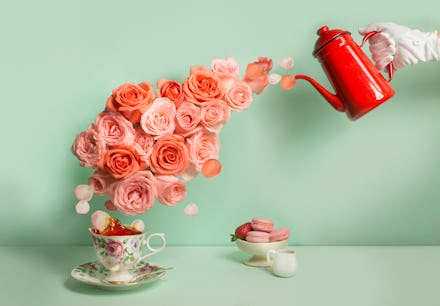Is rose tea healthy or just hype? Experts weigh in

A loved one of mine recently gifted me a jar of aromatic rose tea, a current wellness influencer fan fave. I was thrilled, not only because the tea itself — made from actual petals and buds of a rose bush — is beautiful, but also because the notion of sipping on the flower of love seems quite charming. When I mentioned the gift in a group Zoom, one of my friends testified that the rose tea was the secret behind her dewy skin, and another said it “cured” her menstrual cramps. I’ve also read people touting the tea as an anti-inflammatory and even an anxiety treatment. Look — these are quite the claims, so of course, I had to investigate. Roses are amazing and all, but are any of these benefits of rose tea actually real?
After consulting with medical experts, I believe it sits somewhere in the middle of the “healthy or hype” spectrum. “While the idea of drinking rose tea is very alluring given its romantic nature, very few health benefits have actually been verified through scientific studies,” Peter Bailey, a family physician in Oakland, Calif., tells me, noting that rose tea’s primary confirmed benefit is its high levels of antioxidants. He explains that antioxidants are believed to fight off free radicals in your body that can cause cancer, damage cellular structure, and bring on premature aging. These findings, however, generally reflect long-term, preventative usage rather than treatment.
While Bailey says rose tea’s antioxidant properties are its strongest selling point, other doctors I spoke with believe this blooming beverage has a little more to offer. “Rose tea has anti inflammatory properties that can be as effective as other mild medications, which may help address issues like dysmenorrhea,” says Jaydeep Tripathy, an India-based family physician with the telehealth service Doctor Spring, tells me, referencing the medical term for menstrual cramps. Tripathy’s assertions are echoed by some small studies that suggest rose tea can help ease the pain from cramps, but “more research is needed.”
Bailey also points out that much of the existing research that “proves” these various potential benefits rose tea were limited in size and conducted under what he describes as “relaxed scientific standards.” Basically, while rose tea might help with issues like cramping, cognitive abilities, and inflammation, there’s no solid clinical data behind the claims.
So basically, drinking it won’t hurt you and could have some gentle longer-term benefits, but if you need prescription medicine for something, don’t skip it in favor of this delicious but not miraculous tea. “I don't go out of my way to prescribe rose tea, but if a patient asks if it is alright to drink, I do support it,” Bailey says.
I’m a big fan of science, but I also have a deep respect for the knowledge that gets passed down through generations of lay healers. As Tripathy points out, rose tea is considered a traditional herbal remedy of this ilk is considered to have many benefits which might be not be recognized by Western medicine. For example, in the traditional Indian system of medicine known as Ayurveda, rose tea is thought to be balancing, cooling, and soothing — none of which are qualities that can be measured in a lab. Rose tea has pretty strong roots in traditional Chinese medicine, too. So how seriously you consider it to treat ailments really depends on your belief system.
Both Bailey and Tripathy agree that drinking rose tea, which is caffeine-free, will at least keep you hydrated. And it seems to have very few negative side effects (unless you’re allergic to blooming flowers), so it’s hardly a risky drink. Bottom line: If you’re bored of the latest La Croix flavor and hoping for a bit of pain relief, relaxation, or balance, feel free to reach for the rose tea, in moderation.
Depending on where you get it, rose tea can range in price. But even on the high end, it comes out to about 40 cents a cup, which seems like a small price to pay to stay hydrated and up your antioxidant intake, all while enjoying the romantic rituals of tea making and drinking. All in all, I’d say that this rose (tea) has very few thorns, even if the fullness of its beauty can’t be measured by science.